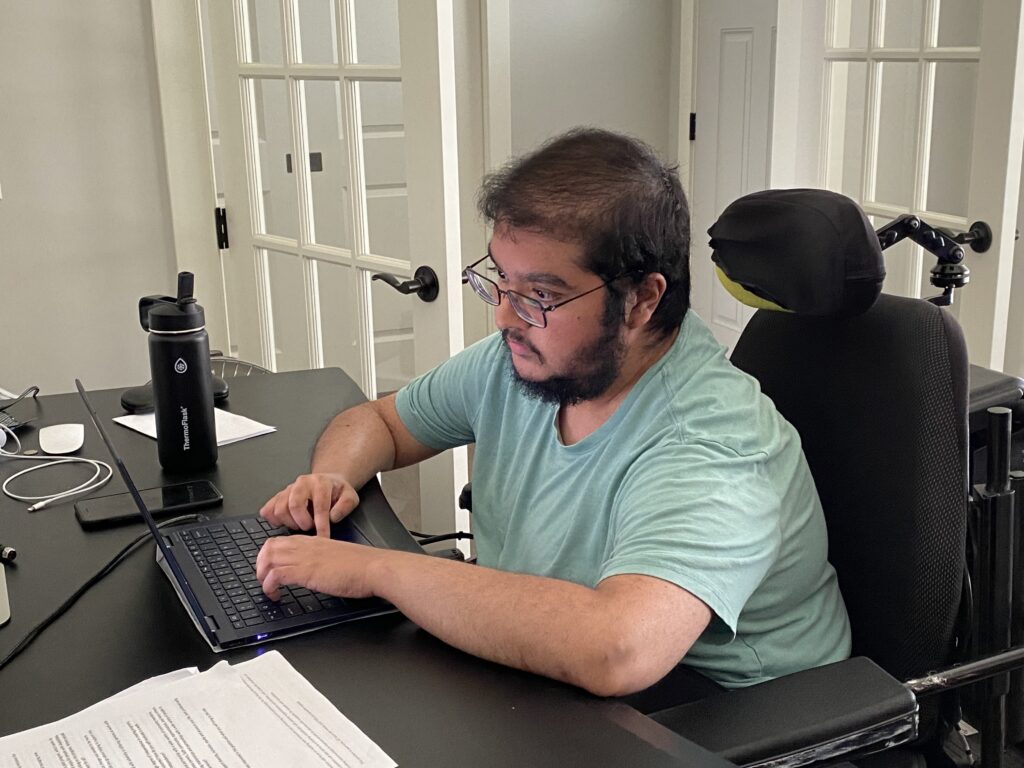 My name is Sumukha Terakanambi, and I am a Policy Consultant with the Minnesota Council on Disability. For the last few years, my goal has been to gain full-time employment as a disability and healthcare policy advocate. In addition to giving me opportunities to pursue what I am interested in, I view employment as a path to achieving more independence, participating in the community, and building financial security. As a person with a disability, I have the desire and ability to work like anyone else. Unfortunately, I – and so many others with disabilities – still face negative stereotypes and systemic barriers when searching for employment.
My name is Sumukha Terakanambi, and I am a Policy Consultant with the Minnesota Council on Disability. For the last few years, my goal has been to gain full-time employment as a disability and healthcare policy advocate. In addition to giving me opportunities to pursue what I am interested in, I view employment as a path to achieving more independence, participating in the community, and building financial security. As a person with a disability, I have the desire and ability to work like anyone else. Unfortunately, I – and so many others with disabilities – still face negative stereotypes and systemic barriers when searching for employment.
This is the sixth in a series of seven blog posts exploring the major barriers to employment for people with disabilities across the state.
- An Overview
- A Lack of Information about Supports
- Stereotypes and Denying Accommodations
- A Lack of Accessible Transportation
- Support Programs that Discourage Work
- A Lack of Legal Supports
- Conclusions
Background
Employees and job applicants with disabilities have rights and protections against discrimination under the Americans with Disabilities Act (ADA) and the Minnesota Human Rights Act. However, they need access to legal services to defend those rights and protections. This blog post outlines the difficulties people with disabilities can have accessing legal resources. I will also propose some possible solutions to address these difficulties.
Current Issues with Legal Services
In Minnesota, disability-based discrimination is the most common form of employment discrimination (PDF) investigated by MDHR. Programs like Vocational Rehabilitation and employment supports provide self-advocacy and negotiation skills training. They do not handle workplace discrimination claims. The Disability Law Center and the Department of Human Rights handle discrimination claims. With a large case backlog, these legal organizations can’t take on every case. “They cannot have that ‘let’s take on every case’ mentality with every single call,” said David Fenley, the ADA director at the Minnesota Council on Disability. “They just don’t have the capacity; it’s just not possible.”
Without proper legal support, people facing discrimination must fend for themselves. Often, they quit their jobs rather than spend the time, energy, and money needed to defend their rights. Sophie Iverson, an options counselor at the Disability Hub and a self-advocate, quit a previous job for that reason. “I left because I didn’t think that it was worth fighting for in the legal field. It was not worth it for the amount of time and money that I was going to be getting into. I had already exhausted all the employer options and legal resources always have money attached to them.”
Michelle Severson, the Access Consultant at the Minnesota Council on Disability, echoed this sentiment. “It is a very involved process and would take a really long time. And sometimes people are suffering or dealing with tough issues in the moment and do not necessarily have the time or recourse to have a yearlong process.”
Possible Solutions
There hasn’t been much discussion in the legislature this session about improving access to legal services for people with disabilities. Still, possible solutions include:
- Providing more funding to the Department of Human Rights and the Disability Law Center. This increase could fund more personnel to address the case backlog and ensure that people with disabilities can have their discrimination complaints investigated in a reasonable amount of time.
- Providing civil rights resources to people with disabilities when they interact with various agencies responsible for providing employment support. This will go a long way toward ensuring that people with disabilities are more informed and less overwhelmed if they encounter discrimination. The Minnesota Council on Disability has developed the resource Know Your Rights as an Employee for people with disabilities.
Conclusion
People with disabilities should be able to fight for their rights when discrimination occurs. This will not only help people with disabilities be successful in their careers but will also hold employers accountable for their responsibilities under the ADA. Advocates and lawmakers need to work together to ensure that people with disabilities can access affordable and effective legal services.